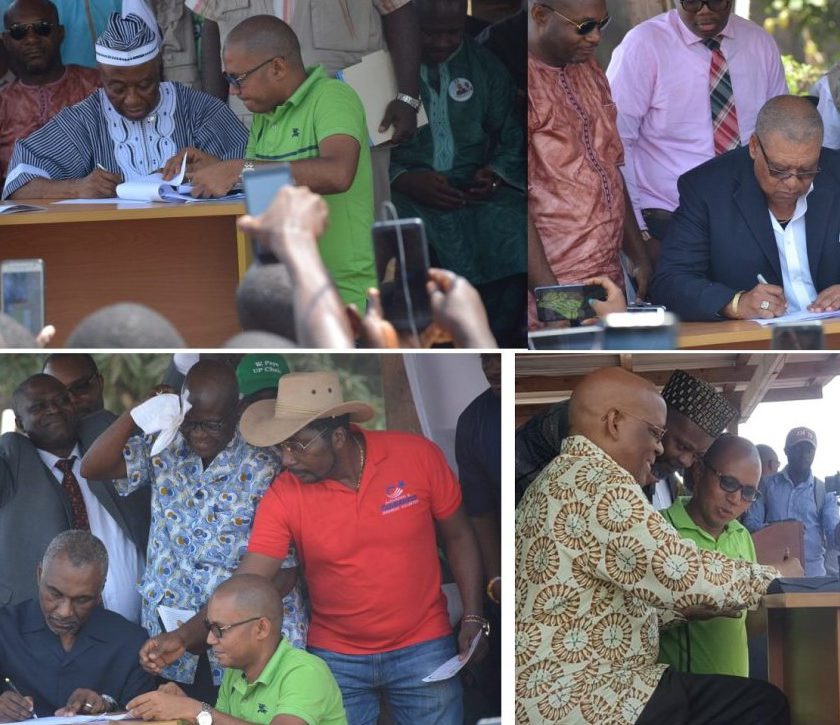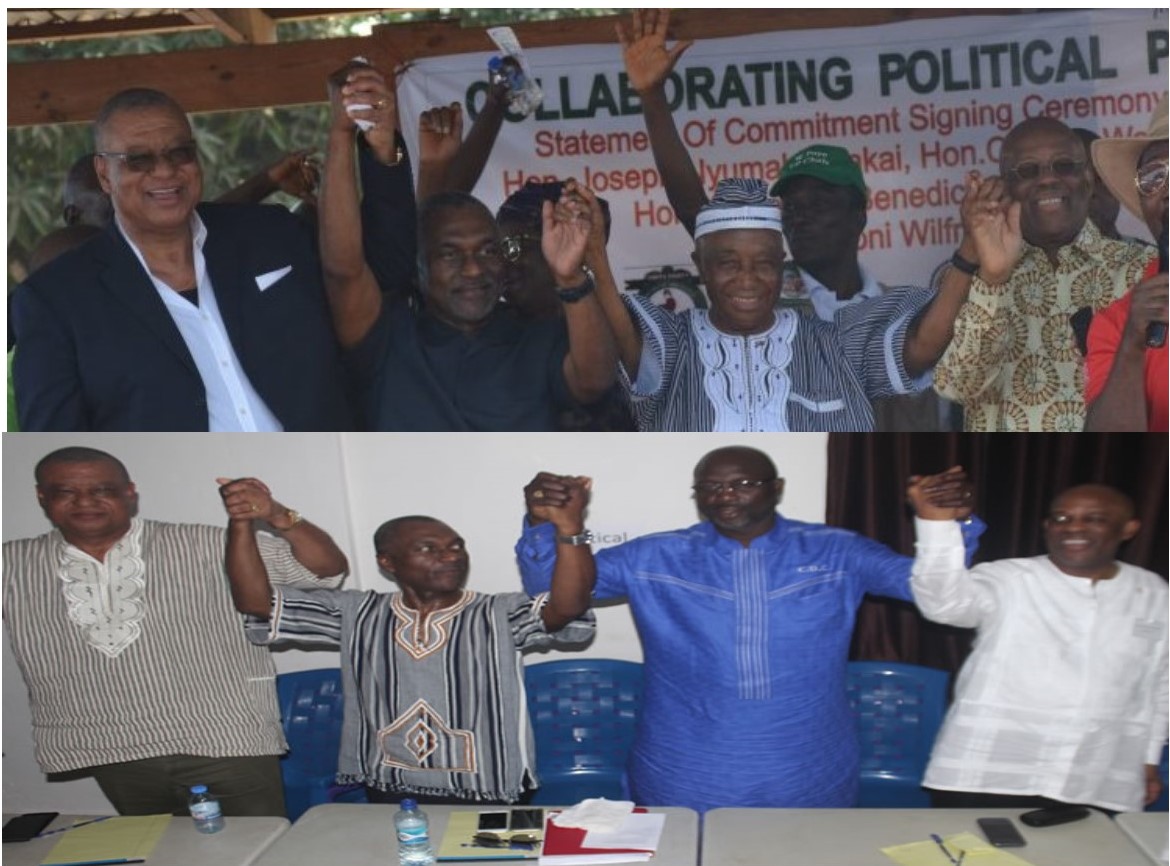By Frank Sainworla, Jr. fsainworla@yahoo.com
Amidst a huge turnout of supporters, four opposition political parties—UP, ALP, LP and ANC—on Thursday signed a Memorandum of Understanding (MOU) to unite, just over one year after the 2017 presidential elections and five years to the next polls.
“Today, Liberia is once again making history. Over the year we have heard the clarion call from Liberians both at home and abroad and also the call from our international partners of the need for the opposition to unite,” they said in a statement read by ALP leader, Mr. Benonoi Urey on February 21, 2019.
The four 2017 presidential candidates who reached the collaboration deal are—former Vice President, Joseph Nyumah Boakai of the former ruling Unity Party, Cllr. Charles Walker Brumskine of the Liberty Party, Mr. Benoni Urey, of the All Liberia Party and Mr. Alexander B. Cummings of the Alternative National Congress.
They said that the move is in response to a “clarion call” for unity amongst the opposition.
“Today, we are signing a document that begins the process of the unity we have been craving for years. We have decided to put Liberia first and to attune our political agenda in the interest of Liberia and the Liberian people; and above our individual and partisan ambitions. We are taking the bold and concrete step which we hope will never be reversed or undone,” the joint agreement said.
More than a year ago, a similar and more critical call was made for the opposition to unite in the run up to the first round of the 2017 presidential and general elections, when the UP was then the ruling party.

While committing themselves then to uniting as opposition then against the ruling party, the opposition parties who signed the Ganta Declaration, which was signed by 12 political parties (including the ones) the latest pact said, “despite our diversity of political ideologies, there is still a possibility of placing all of our respective problems and views. What can opposition political parties do to rebuild and restructure the entire fabrics of the nation?”
However, that didn’t hold and the rest is history, to the disappointment of thousands of opposition party members and sympathizers who wanted to see the back of the then ruling party, UP.
The four parties who signed Thursday’s deal together represent 47.2% of the 2017 elections vote in a country with over 20 political parties.
According to Liberia’s new election law amended in 2014, fifteen of the 20 political parties and independent candidates who took part in the October 10 elections are likely to be barred from taking part in two subsequent elections, because they fall below the 2% votes the threshold required.
The elections law on threshold was approved September 17, 2017. And if implemented, this would automatically reduce the number of political parties in the next two elections in this country.
The 15 parties and presidential candidates who have failed to hit the 2% target are Benoni Urey of the ALP-1.6%, Joseph Mills Jones (MOVEE)-0.8%, Macdella Cooper (LRP)-0.8%, Henry Boimah Fahnbulleh, Jr (LPP)-0.7%, Macdonald Wento (UPP)-0.6%, Simeon Freeman (MPC)- 0.4%, Isaac Wiles (DJP)-0.4%, Alloysius William Kpadeh (INDEPENDENT) 0.4% , Kenndey Sandy (LTP) 0.4%, William Tuider (NLP) 0.3% , George Dweh (RDC) 0.3%, Jerimiah Whapoe (VOLT) 0.3%, Yarkpajuwur Mator (INDEPENDENT) 0.1% and Wendell Mcintosh (CDA) 0.1%.
“A political party or independent candidate shall be suspended if the candidate/s nominated in an election for the presidency or a seat in the Legislature receives insufficient support in that election thereby resulting into: a. none of the party’s candidate is elected, and b. the total of all valid votes cast for all candidates in the constituencies in which the party contested, the Commission shall suspend the party’s right to nominate candidate for the next two elections for the same office,” says Chapter 5A 1 under the caption, REVIEW OF PARTY RESULTS.
Some political analysts think this could be one of the best options to consolidate the opposition ahead of the next 2023 presidential and general elections. But the big question is: will their expressed commitment to uniting hold, in the still far away elections year?
In the latest UP, LP, ANC and ALP’s unity memorandum of understanding, ALP’s leader Benonai Urey said: “We as political leaders must commit to this process as we will doing today by the signing of this statement. We are soliciting the help of our people by their insistence of our continuation of this collaboration. We as a people must ensure that our political leaders put the interest of the country and people paramount to theirs.”
The four collaborating political parties also took President George Manneh Weah and his ruling party, CDC to task for their recent claim against the opposition that they were plotting to assassinate President Weah, a claim which has so far not been substantiated.
“As we set-out on this incline along our sojourn to democracy, we are want to attract the parody and rants of apprehensive and hypocritical hordes hurling their aspersions of, to name a few “enemies of the state”, the four collaborating parties said in their MOU.
As they pledged their commitment to the common interest of the Liberian people, the opposition politicians, who have all not given up their presidential ambitions, acknowledged their past “missteps”.
“We all have made mistakes and missteps in the past. This has led us to where we are today. Fortunately for us as a people we have been given a new lease on life to correct our dark past.”
The opposition politicians also recognized that the only way the opposition can democratically wrestle power from the CDC who have already made no secret of their intention to keep power forever said: “Aware that Liberia’s political process needs a selfless approach that subordinates our individual aspirations and ambitions to the national good, the leaders expressed a willingness to work together in the interest of Liberia for its survival, peace and prosperity which are of utmost priority and consideration.”
The news of the four opposition parties’ decision to put pen to paper formalizing their collaboration has gained huge attention from the public, with callers on the various local radio talk shows welcoming the move, while others have criticized it.
Those who are hailing the move think it is wise decision, when the CDC government has found itself plunged into quite a number of controversies and claims of corruption, lack of transparency and accountability and other bad governance practices.
But supporters of the CDC on various radio stations on Thursday made mockery of the unity deal signed at the headquarters of the main opposition UP. They think such an agreement will not hold in the long-run.

